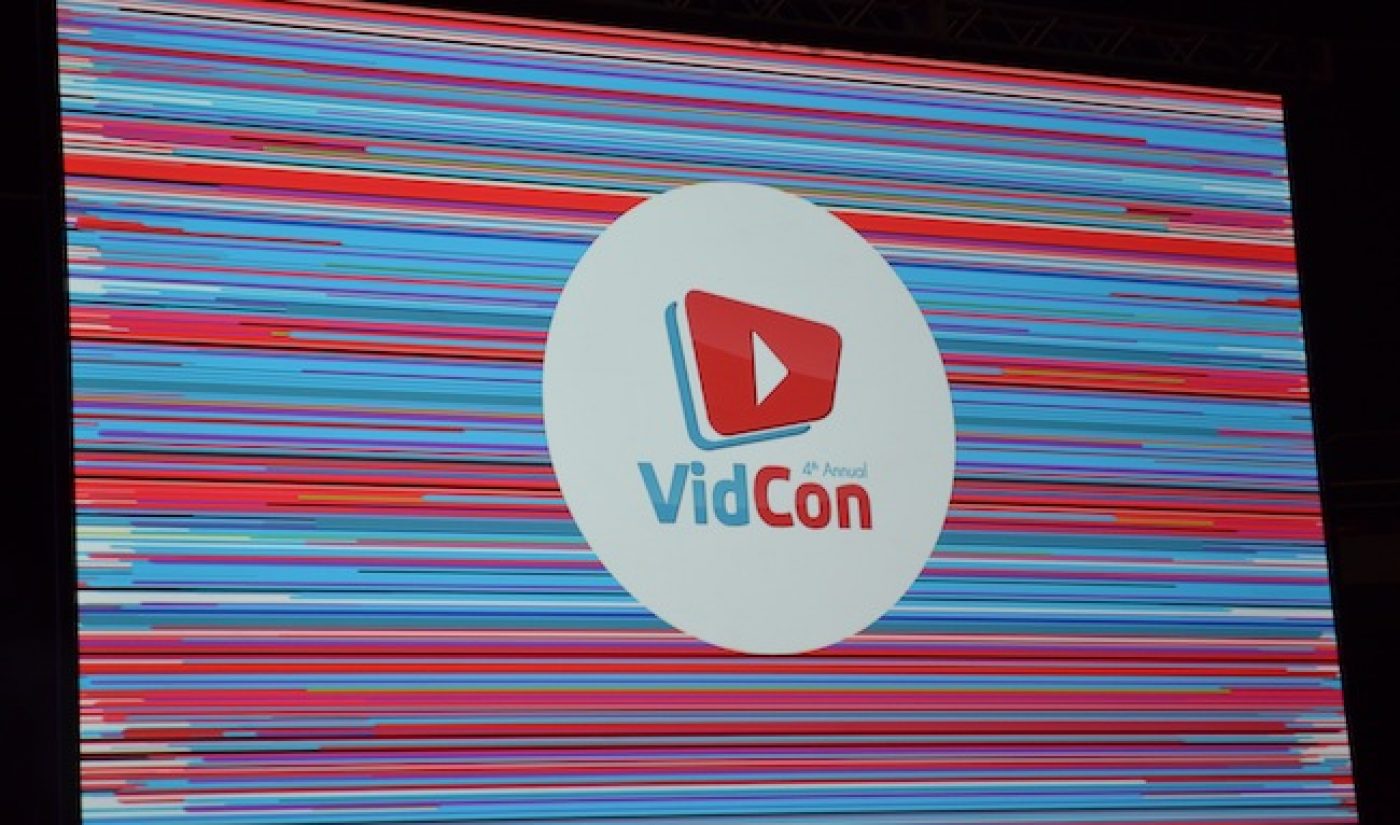[Editor’s Note: Reece Pacheco is the cofounder and CEO of Shelby.tv. He previously worked in production and post production on national TV programs and in Hollywood. He has studied and produced video as a modern medium for over 10 years and often shares his thoughts on the Shelby.tv blog.]
VidCon may only be a four year old conference, but this year’s industry track was packed with major players and big thinking around the future of online video. Here were my major takeaways from 48 hours in the room with a few of online video’s most notable professionals.
YouTube – love it or hate it – is here to stay.

Subscribe to get the latest creator news
 Mark Suster, entrepreneur, angel investor and investment partner at Upfront Fentures kicked off VidCon’s industry track keynote with a tremendous presentation on the state of the video industry. Among his many takeaways was a discussion of the value YouTube provides its creators. Suster noted that many seem to take for granted the amazing unseen infrastructure YouTube supplies in terms of creator tools, hosting/storage capacity and costs, and a massive CDN (content delivery network).
Mark Suster, entrepreneur, angel investor and investment partner at Upfront Fentures kicked off VidCon’s industry track keynote with a tremendous presentation on the state of the video industry. Among his many takeaways was a discussion of the value YouTube provides its creators. Suster noted that many seem to take for granted the amazing unseen infrastructure YouTube supplies in terms of creator tools, hosting/storage capacity and costs, and a massive CDN (content delivery network).
That underlying framework coupled with YouTube’s massive audience makes for a great opportunity for ad sales. And to compete with the company’s scale is nearly impossible. Hence, why most of YouTube’s contemporaries try to supplement the site rather than engage it in a head-to-head competition.
But everyone knows (or at least expects) someone will eventually compete with YouTube, but who?
As pro-YouTube as Suster is, he also cautioned against the potential for Amazon – one of the few companies with the kind of infrastructure scale necessary to compete – to jump into the video industry full force. Sure, they have content available via Prime and they’re rumored to be working on an over-the-top (OTT) box, but the last step is turning on audience development with their hundreds of millions of users.
Is it a sure thing? No. But very possible and worth keeping an eye on? Definitely.
Conversely, in the packed panel titled “The Perfect Platform” moderated by Peter Kafka from AllThingsD, online video veteran Fred Seibert (of Frederator Studios) stated the next great YouTube competitor is hiding in the mind of a 15 year old kid who sees in plain sight some pain point we all take for granted. That seems unlikely to me given the issues around infrastructure, but hey, Seibert knows a thing or two about smart young founders.
The future for multi-channel networks (MCN’s) is still unclear.
As Suster put it, YouTube can ignore the MCN’s but the competition won’t. Would Maker or Fullscreen actually leave YouTube? Unlikely. But could new MCN’s spring up on top of Amazon’s infrastructure? You bet.
Among the crowd of creators, I met at least a few YouTubers who have thus far abstained from joining an MCN, though they all confessed their starting to consider a variety of partnerships. Meanwhile, YouTube’s M.O. seems to be “Who needs an MCN? We’ve got everything you need!” At least that’s what I got from the “MCN or Not?” panel, on which YouTube’s Courtney Lischke reminded the crowd they have all the tools you need.
YouTube to creators: Stick with us in the long run.
During YouTube’s closing keynote, they were two key takeaways.
 The first came from YouTube’s Vice President of Sales & Marketing, Lucas Watson. “YouTube has a ton of scale, it’s still growing like hell across the globe, and we have a 12,000 person salesforce to help you make money,” he said. “So stick with us for the long run.”
The first came from YouTube’s Vice President of Sales & Marketing, Lucas Watson. “YouTube has a ton of scale, it’s still growing like hell across the globe, and we have a 12,000 person salesforce to help you make money,” he said. “So stick with us for the long run.”
He’s obviously not wrong. YouTube does have scale, they do have a huge sales force (about which they reminded everyone ad nauseam) and they are aligned – in that they make money when creators make money – but the overall vision was so high-level it felt empty, at least in my opinion. If YouTube really does know where industry is headed (or, to use Watson’s analogy, “where the puck is going”) they didn’t quite share it with the crowd. That being said, the product announcements from the YouTube Product Managers are my second takeaway and seem to be harbingers of a world where all our bases are belong to YouTube.
One of the big gripes YouTubers have with the platform is the lack of tools with which they engage their fans. To help, YouTube announced “Top Fans,” a way for creators to see who their most engaged fans are… and then, wait for it, place them in Circles on Google+ and engage with them there/ It’s a strategic move for YouTube, but clearly they’re trying to own the end user relationship more than the creators themselves. And, as we’ve already heard, that’s not going to fly.
Whether you’re with an MCN or an independent creator, it’s all about quality engagement.
I cannot state this strongly enough. The creator-fan relationship is paramount in the YouTube ecosystem. These creators have developed amazing two-way relationships unlike we’ve seen in any other medium, on any other platform.
 These fans were everywhere at VidCon, looking for photos with and autographs from their favorite stars, and it’s all because of the deep engagement built within these niche audiences. On YouTube, you don’t have to have millions of views to have passionate fans (though many do), you just need to engage. To this end, creators and MCN’s alike want more and better tools to develop their audience. That’s why products like Epoxy, VidIQ, Subblime, and Subbable are popping up, but as John Green put it best in the opening keynote, it’s about incentivizing the right behavior for creators. “If creators are incentivized to create content that appeals to the broadest possible audience, we will not have the best content afforded us by the internet…we’ll have broadcast.”
These fans were everywhere at VidCon, looking for photos with and autographs from their favorite stars, and it’s all because of the deep engagement built within these niche audiences. On YouTube, you don’t have to have millions of views to have passionate fans (though many do), you just need to engage. To this end, creators and MCN’s alike want more and better tools to develop their audience. That’s why products like Epoxy, VidIQ, Subblime, and Subbable are popping up, but as John Green put it best in the opening keynote, it’s about incentivizing the right behavior for creators. “If creators are incentivized to create content that appeals to the broadest possible audience, we will not have the best content afforded us by the internet…we’ll have broadcast.”
All in all, the VidCon industry day gave a deep look into the video ecosystem, at least according to YouTube, and set the stage for a bright future. It’s also worth noting Vimeo, Blip, Dailymotion, Hulu et al were noticeably absent from the event to me, but certainly not to the hardcore YouTube fans.
 Reece Pacheco is the cofounder and CEO of Shelby.tv, the second online video startup he founded. Pacheco previously worked in production and post production on national TV programs and in Hollywood. He has studied and produced video as a modern medium for over 10 years and often shares his thoughts on the Shelby.tv blog.
Reece Pacheco is the cofounder and CEO of Shelby.tv, the second online video startup he founded. Pacheco previously worked in production and post production on national TV programs and in Hollywood. He has studied and produced video as a modern medium for over 10 years and often shares his thoughts on the Shelby.tv blog.
Shelby.tv is billed as the best way to discover and enjoy web video. Coming soon to the iPhone, the Shelby.tv app delivers you a personalized channel of videos from sources like YouTube, Vimeo, Hulu, Blip, and DailyMotion, as well as video shared by your friends on Twitter, Tumblr, and Facebook. Over time, Shelby.tv gets smart about what you like and don’t like and improves recommendations to give you that perfect daily dose of video entertainment.
Photos by Will Keenan, Josh Cohen, and Sadie Hillier.








